Toyota’s 4Runner has proven itself to be a capable off-roader. But some model years are better than others — and some should be avoided altogether.
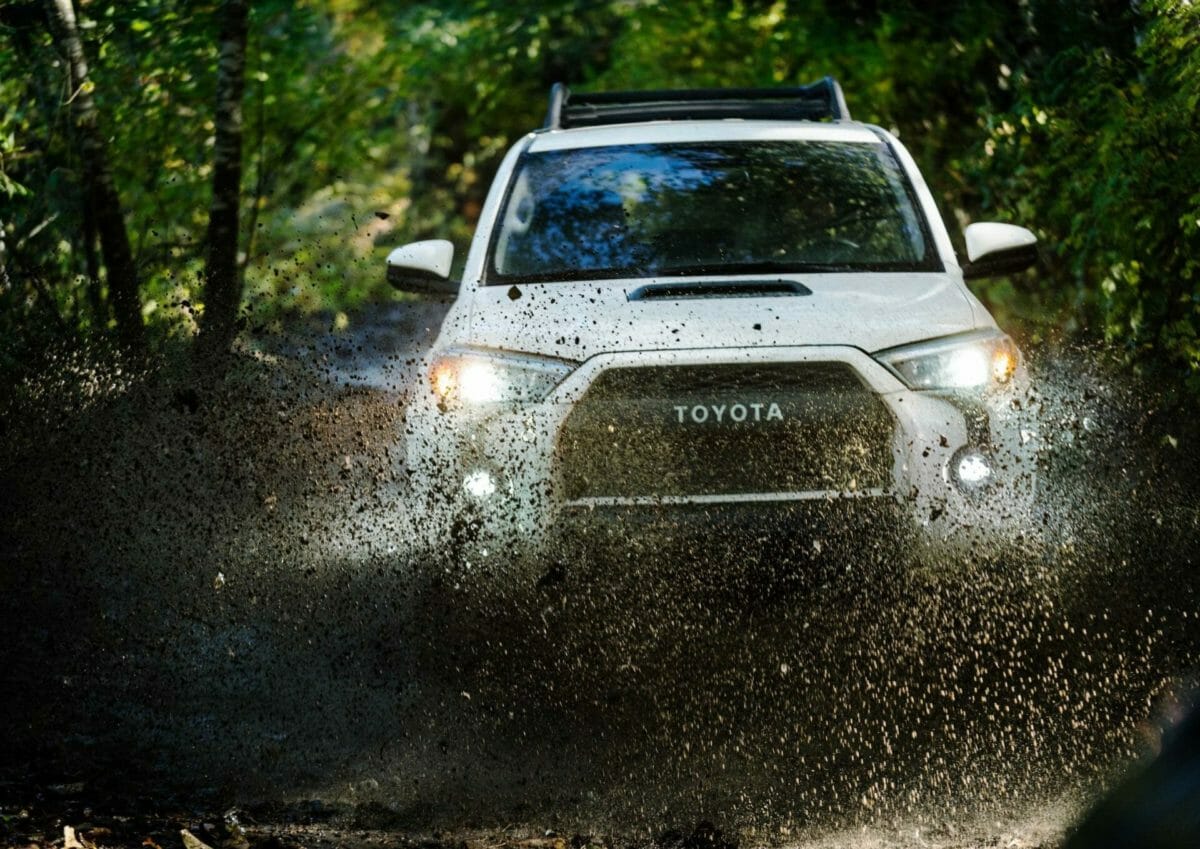
The Toyota 4Runner has been around for over 35 years and has done something that is rare in the car scene: stick to its roots. However, the 4Runner’s legacy really began in 1981 with the Trekker, which essentially was a Toyota pickup with a bed cap added. The only difference was that the Trekker would be assembled with the help of Winnebago, while the 4Runner would not.
Whereas other vehicles have adopted the trends that are common in their category, the 4Runner’s purpose has remained stagnant. Its purpose is to remain fully capable when taken the road less traveled, whereas its car-based competitors cannot say the same.
Time and time again, rugged vehicles have shifted from their initial purpose of being a capable off-roader to a soft, road-going machine. While the 4Runner is an excellent off-roader, it still has its problems.
However, using the guide below, or the cheat-sheet at the end can help you avoid buying a dud.
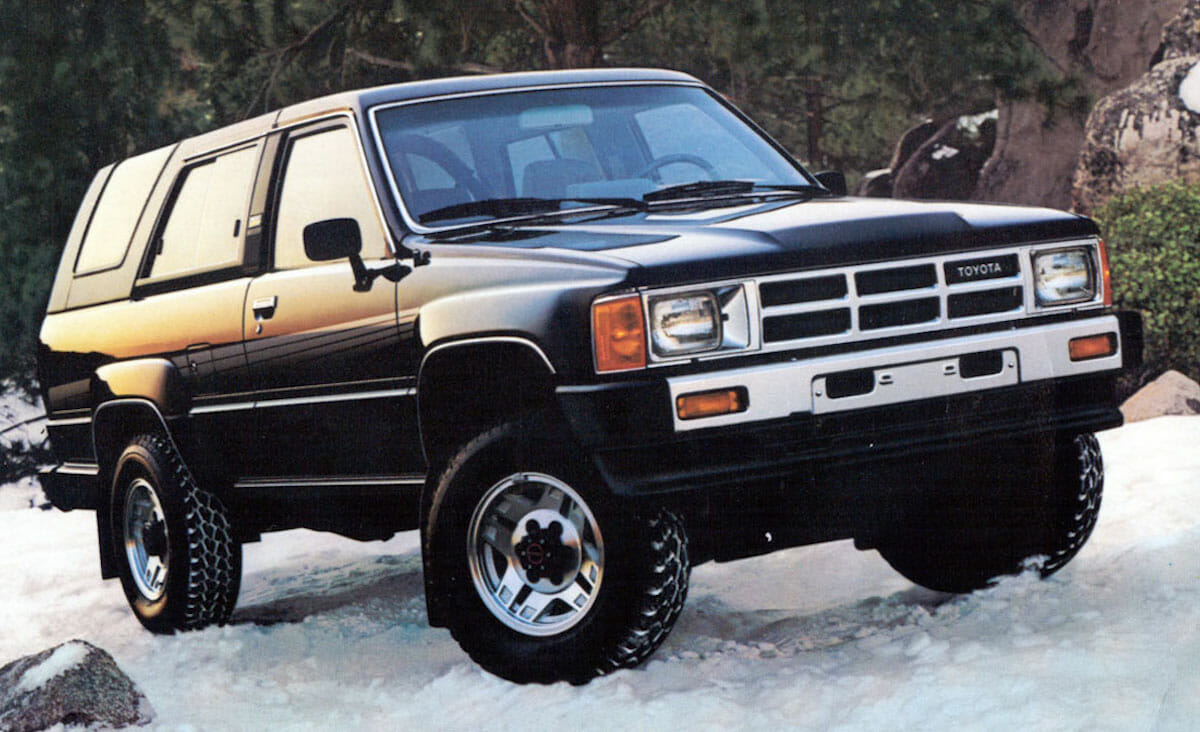
First-generation (1984-1989)
The first-generation Toyota 4Runner hit showrooms for the 1984 model year.
However, it is hard to say that it was a new vehicle for the Toyota lineup. This is because it was “heavily influenced” by the Toyota Pickup (yes, that’s really its name).
However, I believe I say heavily influenced too conservatively. The 4Runner was almost literally a Toyota pickup with a camper shell dropped onto the back and rear seats tossed in the back.
To distinguish the 4Runner from a pickup truck with a cap, the 4Runner boasted a retractable rear windshield that would drop down into the tailgate.
All Toyota 4Runners were built on the Pickup’s two-door, short-bed platform. They featured a removable top and sported a 2.4L I4 engine that produced less than 100 hp.
Also offered were a 2.4L I4 turbo and 3.0L V6, each produced 135 and 150 hp, respectively. These engines came standard with a five-speed manual or four-speed automatic transmission.
First-gen. 4Runner: Years to Avoid & Better Alternatives
- Years to Avoid: 1988-1989 w/3.0L V6
- Better Years: 1986-1987 w/2.4L I4
- Best Years: 1984-1985 w/2.4L I4
There are not many complaints on the NHTSA for the original 4Runner. However, one of the most common problems was a sagging suspension. This was due to Toyota failing to upgrade the rear springs when converting the Pickup to a Highlander.
Also, while the 2.4L I4 engine was very reliable, the same cannot be said about the 3.0L V6 as it was notorious for head gasket leaks, with online forums being inundated with complaints. Many posters claim the issue is due to a design flaw in the heads, while others simply suggest swapping out the 3.0 for the 3.4 V6.
Other common problems include rust, worn-out parts, and leaks of all varieties. Also, demand for the first-generation is very high as many consider it an admirable off-roader.
However, since there were few made, you can expect to pay high prices for the original 4Runner.
There are also problems to consider if you plan on buying the 4Runner as an off-roading vehicle. Believe it or not, the 2.4L I4 engine that produces around 100 hp will not get the job done in extreme off-roading scenarios. This is not good news considering the turbo edition is ultra-rare and the V6 has had more reliability concerns.
Also, both optional engines came with an upgraded, heavy-duty rear-differential. Despite that, they come with an “upgraded” transmission and chain-driven transfer case.
While the chain-driven transfer case is quieter on the road, it is worse at off-roading than the standard gear-driven transfer case found in the four-banger.
For off-roading, the best years would be the 1984-1985 model years, however, it may not offer enough power because it only produced about 100 hp. These years are best because they have the gear-driven transfer case, solid front axle, and the most reliable engine offered.
If the 1984-1985 model years are too rich for your blood, any other year should get the job done. So long as it’s not the V6 because it has some serious reliability issues.
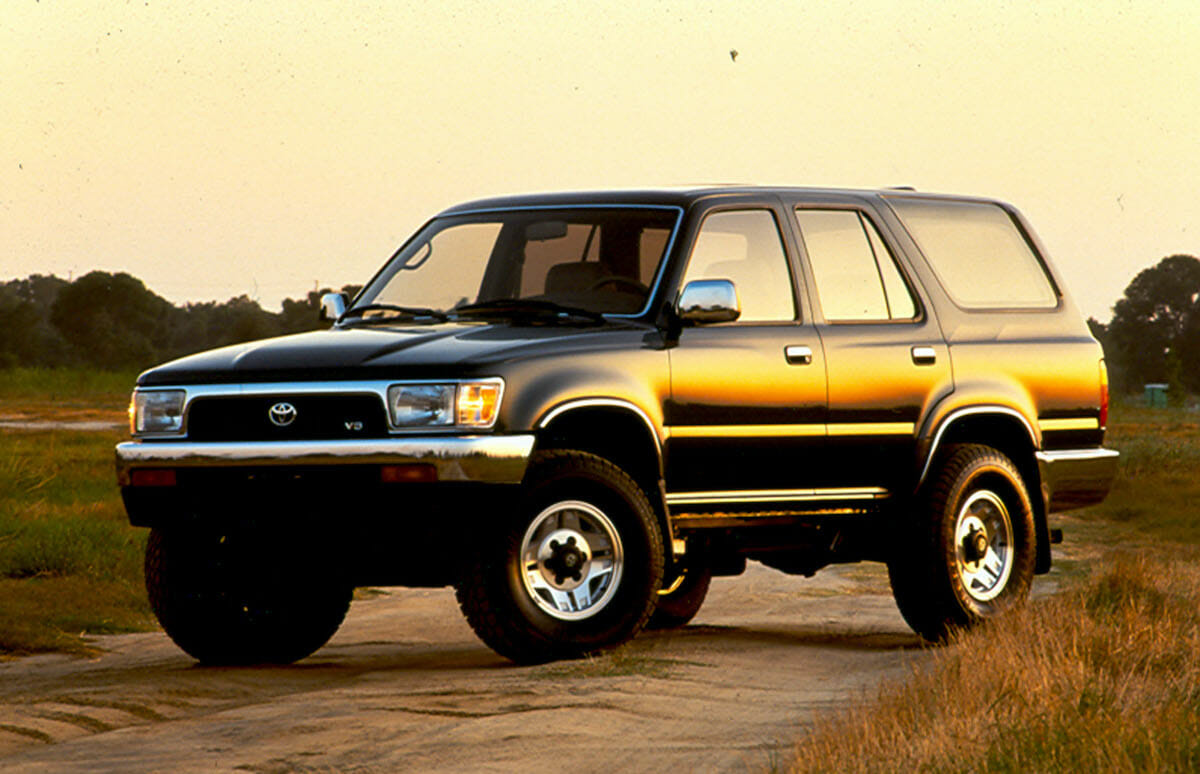
Second-generation 4Runner (1990-1995)
The second-generation Toyota 4Runner was released for the 1990 model year. Although it was a new generation of 4Runner, it seemed very similar to the old one. For example, from the B-pillars forward the 4Runner was almost completely identical to the Pickup.
Despite a new coil-spring rear suspension, the second generation also suffered from the same “saggy bottom syndrome” as the last one. The 2.4L I4 gear-driven engine remained the standard engine for the 4Runner and the 3.0L V6 chain-driven engine was still offered. Similar to the last generation, although the I4 offered less power it is considered the more reliable of the two.
However, this was the first-generation 4Runner to feature a full-steel integrated body that would be mounted on the frame. This is opposed to the old 4Runner which merely had the fiberglass bed cap.
Unfortunately, this means the top could no longer be removed on the 4Runner. It’s worth noting that the turbocharged engine from the previous generation was dropped. However, most importantly, the second generation could be had in a four-door version, making it more family-friendly.
Second-gen.: Years to Avoid & Better Alternatives
- Years to Avoid: 1990-1995 w/3.0L V6
- Better Years: 1990-1993 w/2.4L I4
- Best Years: 1994-1995 w/2.4L I4
Due to the low standards for light truck safety in the U.S., it is unsurprising that the second generation was not very safe. When tested by the NHTSA it received one star for driver safety and four stars for passenger safety.
Furthermore, the doors were made of two pieces of sheet metal. Thus, when in a crash the only thing protecting the front occupants was a window and sheet metal, two relatively delicate materials in a crash. Therefore, side-impact beams were added for the 1994 model year.
As for reliability, the V6 engine suffered from failing head gaskets. Other than that, things to look out for are common problems found in older vehicles such as rust, leaks, and of course that saggy suspension.
Since the V6 is unreliable, it should be avoided. Also, because the side-impact beams added on the 1994-1995 model years made the 4Runner safer, it is the best choice.
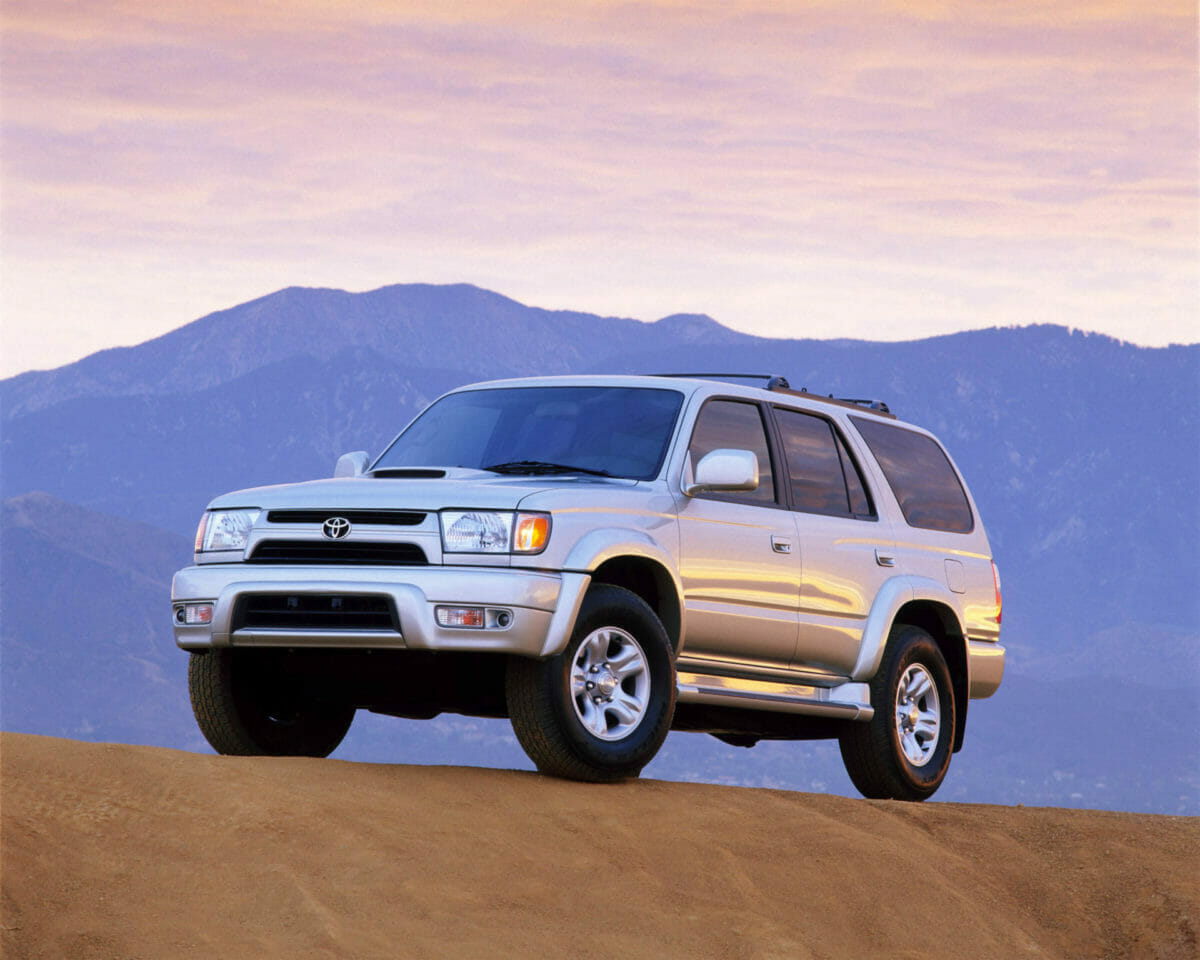
Third-generation (1996-2002)
When the third-gen. 4Runner arrived in showrooms for the 1996 model year, it brought with it some exciting changes. Although the 4Runner did share some parts with the new Tacoma, it finally had a body and chassis to call its own.
The 4Runner did, however, share the same engines as the Tacoma. A new 150 hp 2.7L I4 was made standard, replacing the antiquated 2.4L I4.
Also, a notably more reliable 183 hp 3.4L V6 replaced the untrustworthy 3.0L V6. Other changes included a larger interior, dual airbags, optional ABS, a lift gate, full coil-spring suspension, rack and pinion steering, and increased aerodynamics.
Separating the wheat from the chaff, the third generation decided to stick with its rugged off-road character instead of adopting highway comforts like its adversaries. Plain and simple, this was where the 4Runner made a name for itself.
Third-gen.: Years to Avoid & Better Alternatives
- Years to Avoid: 2001-2002
- Better Years: 1996-1998
- Best Years: 1999-2000
The third-generation Toyota 4Runner was the first of its kind to be tested by the IIHS. Although the previous two generations were unsafe, this was not so for the third generation. It received an overall mark of acceptable, which was just one step below the top mark of good.
In relation to the safety test, the Achilles heel of the 4Runner was its bumpers, which crumpled too easily. However, when it came to reliability, the 4Runner did not fare as well.
It received over 250 complaints on average per model year according to the NHTSA. Plainly, rust was the most common complaint about the 4Runner.
Unfortunately, every model year was affected by excessive rusting.
In conclusion, the third-gen 4Runner took two steps forward when it came to safety and one step back when it came to reliability.
The 1999-2000 model years are the best because they had been majorly redesigned, and they have full-time 4WD. For the 2001-2002 model years, Toyota got rid of the manual transmission and locking rear differential, decreasing the Toyota 4Runner’s off-road capability.
Unfortunately, while Toyota fitted the third-generation 4Runner with an improved V6, they never solved the problem of rusting.
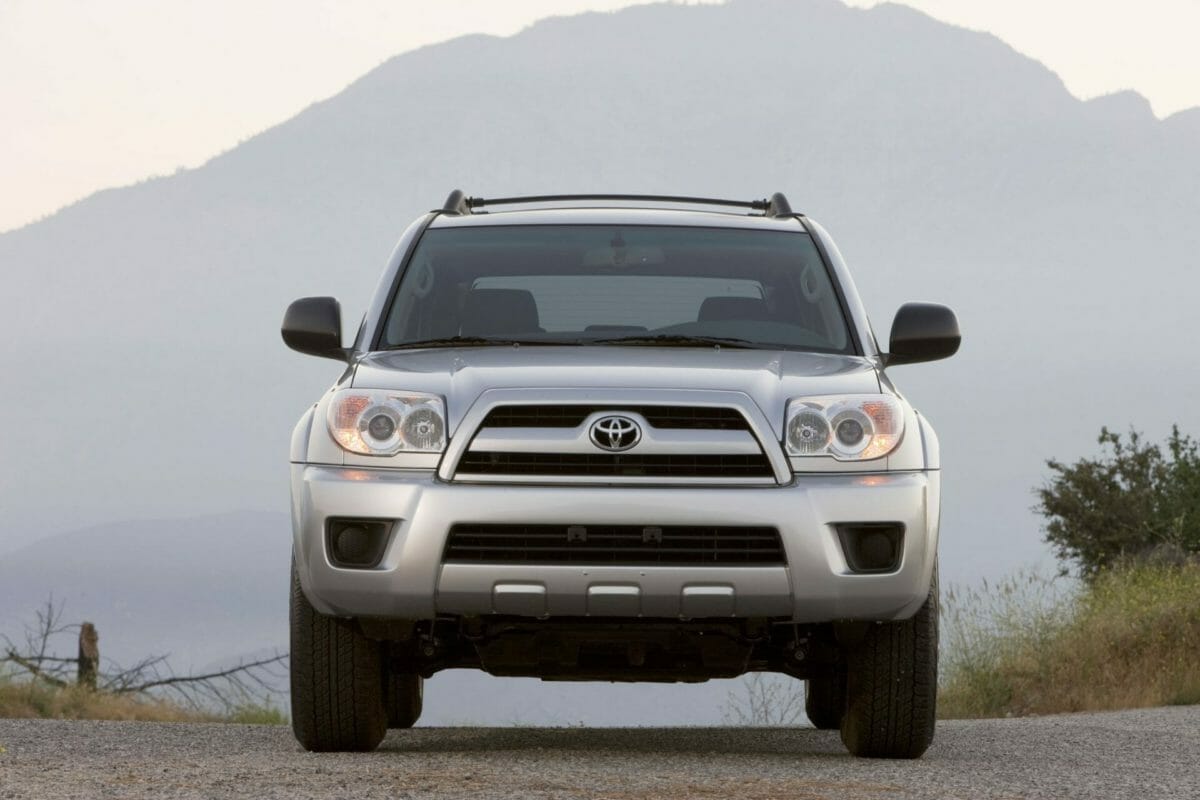
Fourth-generation (2003-2009)
The barely recognizable fourth-generation 4Runner hit showrooms for the 2003 model year. The exterior looked more rounded and car-like, as opposed to the previous generations which put off more of a truck vibe.
Also, several creature comforts were added to the 4Runner such as standard tilt and telescoping steering wheel, remote keyless entry, automatic climate control, driver’s lumbar support, and a power rear tailgate window.
Don’t let these upgrades fool you, the 4Runner still maintained a solid off-roading posture. Standard skid plates, body-on-frame construction, and solid rear axles distinguished the 4Runner from its on-road-oriented peers.
The new standard engine was a 245 hp 4.0L V6. A 265 hp V8 was offered on the 4Runner, this is the first and last time a V8 was offered on the 4Runner. Once again, the 4Runner was marketed as an off-road capable mid-size SUV.
Fourth-gen.: Years to Avoid & Better Alternatives
- Years to Avoid: 2003-2005
- Better Years: 2006-2007
- Best Years: 2008-2009
The fourth generation further improved the 4Runners safety. According to the IIHS, the 4Runner received marks of good in all categories except for head restraints and seats. The head restraints and seats scored as low as possible because the dummy would hit its head off the B-pillar which could cause a concussion.
Standard torso and side curtain airbags, which were added in 2008 also made the new 4Runner much safer in a crash.
However, Toyota’s Star Safety System was the true safety rockstar for the 4Runner, as it could help the driver avoid a crash. This suite of safety equipment included ABS, electronic brakeforce distribution, brake assist, traction control, and VSC.
Reliability for the Toyota 4Runner started off rocky but improved in time. The 2003-2007 model years received over 400 complaints on average per model year according to the NHTSA.
Whereas, the 2008-2009 4Runner received a mere 54 per model year. The most common complaint yet again being excessive rust.
However, the 2008-2009 model years do not seem to be affected by this issue. That being said, when purchasing any 4Runner, rust is very important to look for.
The best years for the fourth-generation Toyota 4Runner are 2008-2009 because of the standard curtain airbags, revised head gasket, and lack of rust. Because of head gasket failure, the 2003-2005 model years should be avoided.
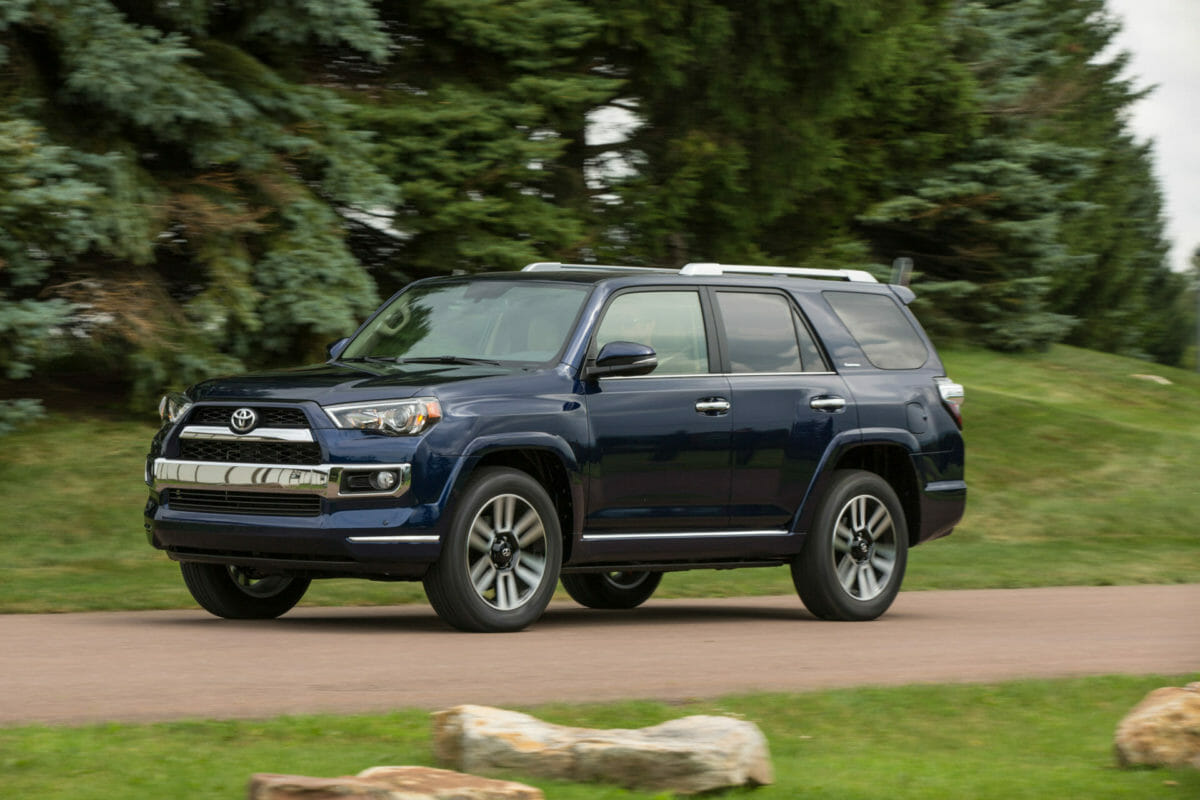
Fifth-generation (2010-Present)
The current fifth-generation 4Runner was released for the 2010 model year. Returning to its roots, the new 4Runner reappeared as the square 4Runner we once knew.
The redesigned ute now boasted a new 4.0L V6 with dual variable valve timing with intelligence (VVT-I). This is important because dual VVT-I increases both performance and mpg.
Interestingly, there is an exceedingly rare version of the 2010 MY only 4Runner that was powered by a 2.7L I4 engine mated to a four-speed automatic transmission.
However, nearly all are equipped with the V6 and five-speed automatic transmission. Interestingly, both the 4Runner and FJ Cruiser are built on the same platform.
Fifth-gen.: Years to Avoid & Better Alternatives
- Years to Avoid: 2014-2016
- Better Years: 2010-2013
- Best Years: 2017-Present
Continuing the trend of the previous generations, the new 4Runner is the safest yet. For the 2010-2012 model years, it received a good in all categories except for roof strength.
However, Toyota strengthened the roof for the 2013 model year, earning it a Top Safety Pick. For the 2014-Present model year, the 4Runner was held back by a marginal score in the driver-side small overlap test and a mark of poor in the headlight test.
However, it is worth noting that Toyota’s Safety Sense P is now standard on all trims, making them much safer.
Toyota seems to have finally nailed down the reliability of their off-roading SUV. According to the NHTSA, the 4Runner received just over 50 complaints on average per model year. The most common complaint for the 2010-2013 model years was the airbags.
However, there is little cause for concern since they have been recalled by Takata. The most common problem for the 2014-2016 model years is failing door lock actuators.
From 2017-present, there have been no common problems reported thus far.
Cheat Sheet
Toyota 4Runner: Model Years to Avoid Like the Plague
- 2003-2005: Fourth-generation 4Runner
- 2001-2002: Third-generation 4Runner
- 1990-1995: Second-generation 4Runner w/ 3.0L V6
- 1988-1989: First-generation 4Runner w/ 3.0L V6
Toyota 4Runner: Model Years that Have Some Problems (But are OK for the Right Price)
- 2010-2016: Fifth-generation 4Runner
- 2006-2007: Fourth-generation 4Runner
- 1996-1998: Third-generation 4Runner
- 1990-1993: Second-generation 4Runner w/ 2.4L I4
- 1986-1987: First-generation 4Runner w/ 2.4L I4
Toyota 4Runner: Model Years that Are Best Buys
- 2017-Present: Fifth-generation 4Runner
- 2008-2009: Fourth-generation 4Runner
- 1999-2000: Third-generation 4Runner
- 1994-1995: Second-generation 4Runner w/ 2.4L I4
- 1984-1985: First-generation 4Runner w/ 2.4L I4
Photos: Toyota
